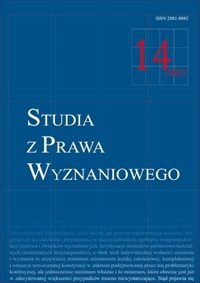Przepisy wyznaniowe w Konstytucji RP (uwagi porządkujące)
Denominational Provisions in the Constitution of the Republic of Poland (explanatory remarks)
Author(s): Jarosław SzymanekSubject(s): Law, Constitution, Jurisprudence
Published by: Katolicki Uniwersytet Lubelski Jana Pawła II - Wydział Prawa, Prawa Kanonicznego i Administracji
Keywords: the relations between the state, churches and other religious organizations; law on religion; the Constitution of the Republic of Poland; freedom of religion; church - state relations (Poland)
Summary/Abstract: The constitutional provisions on denomination, which should be seen as a specific subset within the widely recognized human rights and freedoms, comprise a collection of provisions that either explicitly or implicitly regulate the matters of the religious persuasion of any individual. The provisions that explicitly relate to the position of the individual because of his or her religion and outlook can be referred to as denominational in the strict sense. These include, on the one hand, individual freedom of conscience and religion, and on the other hand, collective freedom related to the religious communities such as churches and other religious organizations. This narrow set of denominational provisions is not uniform. It covers both the general rules regarding freedom of conscience and religion (Articles 25 and 53 of the Constitution) and provisions tackling more specific issues (Article 48, Article 35(2) and Article 85). Besides denominational provisions sensu stricto, also others can be singled out that may be directly tied to the religious aspect the individual's life. This set can be referred to as denominational provisions sensu largo. Among them, the most important provision is the one ensuring the general right to decide about one's personal life (Article 47 of the Constitution). It shows the iunctim, after all, of freedom of conscience and religion with the right to privacy, which today is the most important individual right guaranteed in the Constitution, and also a kind of "prelude" to and "beginning" of all, or at least most of the rights and liberties. Freedom of conscience and religion, and the whole denominational area alike, is after all inextricably linked to the protection of private (personal) life, which the state and its bodies must approach with désintéressement. The increasingly complex and detailed denominational regulations contained in the Constitution seem to accommodate this requirement; irrespective of any divisions and classifications, they are but a derivative of individual rights and freedoms. The constitutional denominational substance together with its constituting denominational provision is after all a form of guarantee of inalienable individual's rights that have their axiological (but also legal) source in the constitutional principle of dignity. The latter is an example of the "encounter" of the, in a way, religious (or canonical) standard and the standard of state law. In both systems of standards, human dignity is indeed the highest and inalienable value, and in both provides the reason for other rights and values.
Journal: Studia z Prawa Wyznaniowego
- Issue Year: 2011
- Issue No: 14
- Page Range: 5-23
- Page Count: 19
- Language: Polish

